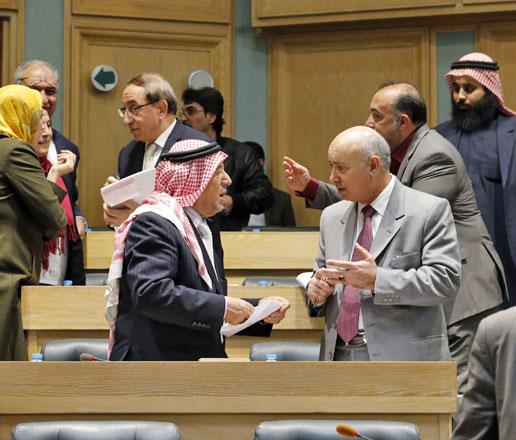You are here
House panel ‘hardly touches’ elections law after months of ‘consultations’
By Raed Omari - Feb 16,2016 - Last updated at Feb 16,2016

MPs and ministers exchange remarks during a House session on Tuesday. Lawmakers are expected to start deliberations over the elections bill on Sunday (Photo by Osama Aqarbeh)
AMMAN — The Lower House's Legal Committee on Tuesday endorsed the 2015 draft elections law almost exactly as referred by the government with some "insignificant" changes.
The head of the panel, MP Abdul Munim Odat, said that brainstorming meetings have been held with representatives of political parties, women and youth groups, professional organisations, legal experts and opinion leaders for feedback and suggestions on the key reform law.
Odat also said that the panel has convened 15 meetings to discuss the proposals it has received from all society segments, adding that the "law is now with the House to complete the process".
In remarks to The Jordan Times, the House’s First Deputy Speaker Mustapha Amawi said the Legal Committee has "turned its back on all suggestions it received from the people it had met with", adding, "99.9 per cent of the law remained exactly as in the government version".
"The committee's changes were all insignificant. As such, the House should have approved the bill the same day it received it from the government. Too much time was wasted," Amawi said.
Citing a statement by the committee, Amawi said that one of the amendments made has to do with procedures that would allow employees of the oversight agency, the Independent Elections Commission, to vote, while another accepts the ballot even if the voter does not check the box that refers to the ticket to which the candidates belong.
Amawi, an established lawyer and former president of the Legal Committee, described the law as received from the government and amended by the panel as “unfair”, citing the gap between population density and the number of parliamentary seats allocated to each constituency.
“It is so unfair to give four seats to an electoral district of 50,000 people and the same number to another district with 227,000 people,” he said.
He explained that there should be a reconsideration of the number of parliamentary seats allocated for electoral districts and the open proportional lists suggested in the law. “The number of the Chamber seats should be also less than 130.”
“We will fight to have these flaws taken care of under the Dome when we start deliberations next Sunday.”
Under the 2015 elections bill, the number of Lower House members has been reduced to 130 from 150, based on the open proportional list at the district level.
The new law is based on an at-large voting system in which all candidates can run for parliamentary elections on one large multi-member ticket.
Under Article 9 of the bill, eligible voters will have a number of votes equal to the number of seats allocated for their district in the Lower House.
Related Articles
AMMAN — The Lower House is expected to receive a "thoroughly-examined" version of the 2015 parliamentary election law from its Legal Committ
AMMAN — Women activists will head to Parliament's gallery next week to demand a seat for women in each of the constituencies that will be de
AMMAN — The 2015 parliamentary elections law is not expected to be finalised during the current extraordinary session, head of the Lower Hou
















